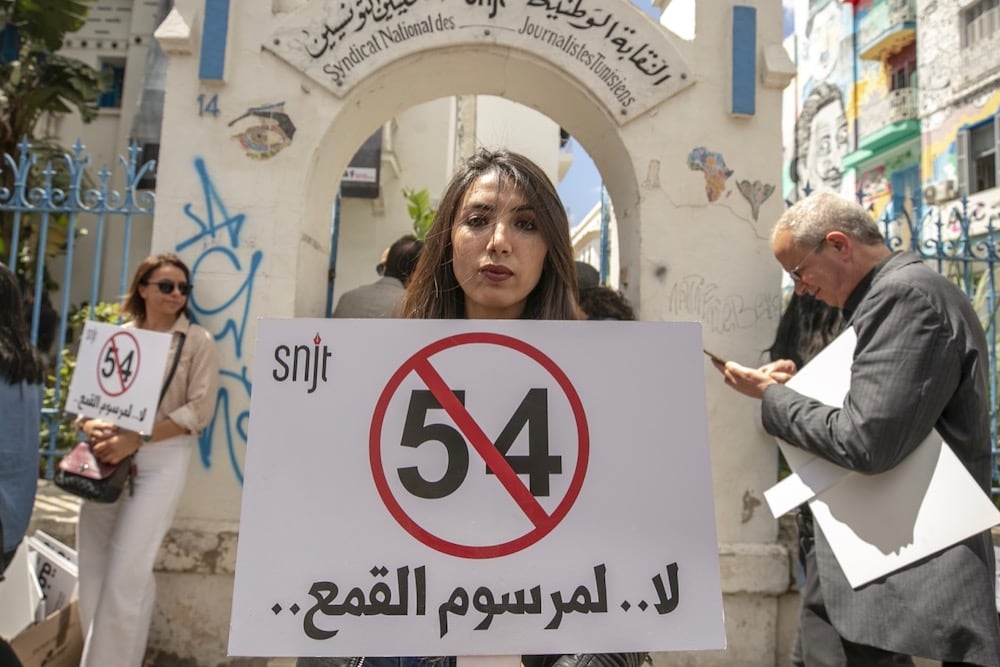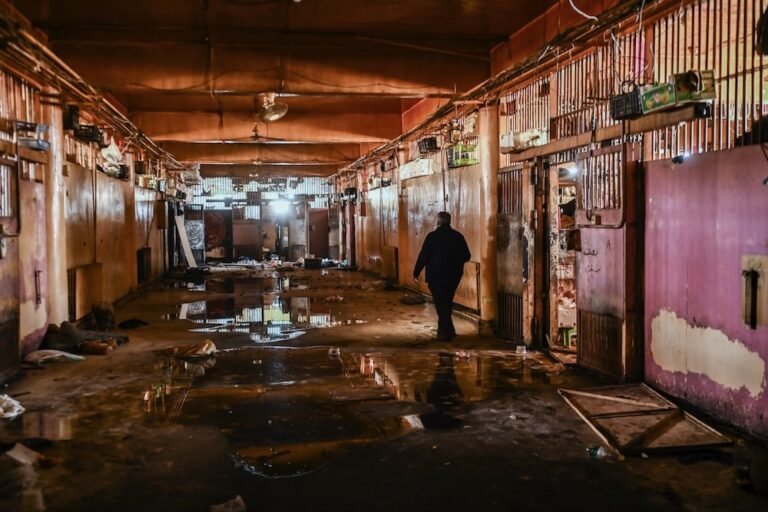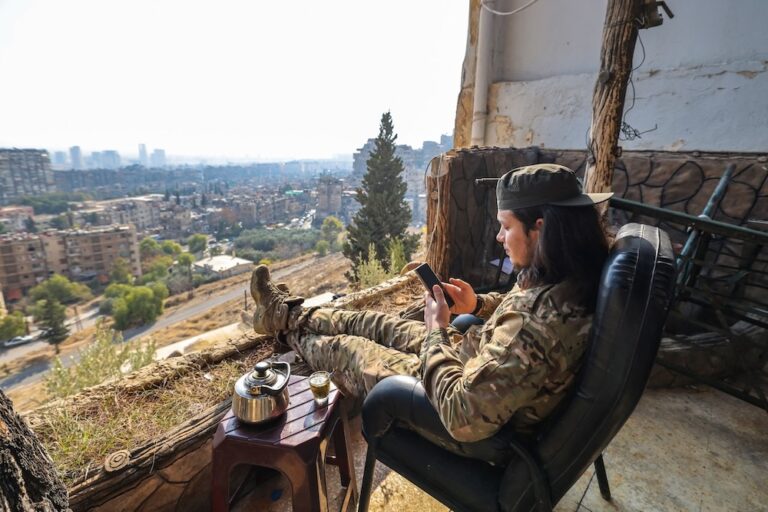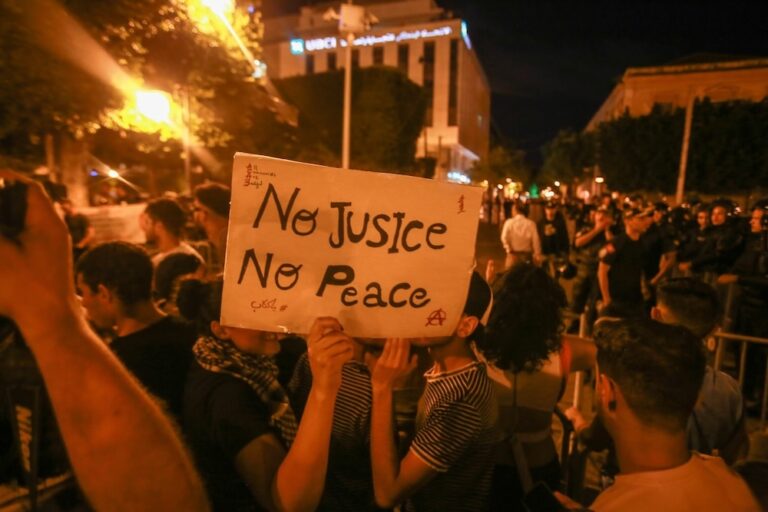Middle East and North Africa: A free expression round up produced by IFEX's Regional Editor Naseem Tarawnah, based on IFEX member reports and news from the region.
Sudan violence targets civil society and access to information; Tunisia and Algeria suppress political dissent; and IFEX members in the region mark World Press Freedom Day.
Sudan: Stranded journalists, propaganda and disinformation campaigns
The unfolding conflict between the Sudanese Armed Forces (SAF), led by General Abdel-Fattah al-Burhan, and paramilitary group the Rapid Support Forces (RSF), led by General Mohamed Hamdan Dagalo (known as “Hemedti”), has seen hundreds reportedly killed and thousands injured since fighting broke out on 15 April.
Rights groups called on the UN Security Council to hold an urgent special session and establish an independent mechanism for accountability into alleged human rights abuses, underscoring how the current situation comes against a backdrop of already severe restrictions of fundamental freedoms.
Amidst an increasingly “untenable” situation for millions of civilians in Khartoum caught up in the violence, safety concerns of Sudanese journalists have also been raised. Several newsroom offices of regional media channels based in the capital came under attack, while the Sudanese Journalists Union reported that fifteen journalists and media workers were stranded for three days inside the Sudan News Agency building without food or basic necessities after the fighting began.
As the conflict escalated in Khartoum, authorities halted the broadcast of Sudan’s state TV after the RSF entered the broadcaster’s building in the city of Omdurman, across the Nile from Khartoum. The RSF used radio networks to amplify propaganda claiming the paramilitary force had taken control of state TV and other strategic facilities, prompting the move to cut the transmission to prevent further dissemination of their messages.
Photojournalist Faiz Abubakr was reportedly shot while covering events in the capital, while BBC Arabic journalist Mohamed Othman was beaten and detained by a group of SAF officers preventing him from reaching his office. Othman later fled the country, documenting the perilous journey many have been forced to take.
With access to information being so critical throughout the developing crisis, internet disruptions have left millions of people who require dependable access to obtain essential resources such as food and water, as well as to locate secure evacuation routes, predominantly in the dark, fuelling further concerns of human rights abuses going unchecked.
“Internet shutdowns mean that whoever blocks the service does not want certain information to spread. In most cases, these actors have malicious or even criminal motives, making the situation even bleaker in Sudan,” said Mohamad Najem, executive director of IFEX member Social Media Exchange (SMEX).
The instability of the networks has not stopped the warring factions from taking their battles online. Both sides are using propaganda and fake news to advance their agenda and control the narrative.
Recent research by Digital Forensic Research Lab revealed that at least 900 potentially hijacked Twitter accounts were being used in a propaganda campaign promoting the RSF. The accounts actively retweeted content posted by Hemedti to amplify RSF’s narrative, and according to the research, promote the paramilitary force to “appear more popular than they actually are on the platform by boosting their tweets and appealing to a more international audience via English-language tweets”.
Twitter’s removal of blue tick verified accounts has also exacerbated Sudan’s chaotic information space, with nearly a million people viewing a fake tweet by an account claiming to represent the RSF and announcing Hemedti’s alleged death, spurring confusion among a population with increasingly limited access to reliable information.
Tunisia’s political opposition purge and Algeria’s threatened media
Tunisian authorities questioned journalists Monia Arfaoui and Mohamed Boughlab after complaints were made against them by the Ministry of Religious Affairs for their critical work. Rights groups condemned Tunisia’s use of repressive laws to suppress criticism of public policies, pointing to how authorities have relied on Decree-law No. 54 to prosecute journalists, which they call the government’s latest legal tool to suppress dissent and prosecute critics.
Last month saw further erosion to the country’s civic space as authorities intensified their attack on President Kais’s political rivals. On 17 April, authorities raided the headquarters of Tunisia’s largest and main opposition party, and arrested its president and prominent critic, Rached Ghannouchi. The former speaker of parliament was later charged with attempting to “change the nature of the state” and “conspiring against internal state security,” crimes that carry a potential death sentence. Ghannouchi joins at least 30 other detained members of Ennahda, including two party vice presidents, Ali Laarayedh and Nourredine Bhiri.
On the heels of Ghannouchi’s imprisonment, family members of political detainees submitted a request to the European Union to sanction President Saied and other top-ranking Tunisian officials, accusing them of “gross and persistent human rights violations”.
Meanwhile, a court in Algeria sentenced journalist Ihsane el-Kadi and dissolved two of the country’s last independent news outlets last month. Arrested in December 2022, El-Kadi, editor-in-chief and director of Radio M and Maghreb Emergent, was charged with receiving “foreign funding for his business” and sentenced to five years in prison, three of which he must serve in jail, as well as paying a fine of 700,000 dinars (US$5,200). The court also ruled to dissolve Interface Médias, which operates both outlets that el-Kadi runs, and have its assets seized and owners fined millions of dinars.
“This decision taken against a courageous journalist and media owner, who has continued, against all odds, to practise his journalism freely, rightly shocks much of his profession,” said journalist and Reporters Without Borders’ North Africa representative, Khaled Drareni.
On 13 April, Algeria’s parliament passed a law that prohibits domestic media from receiving funding or material assistance from any “foreign entity”, tightens media ownership rules by banning dual-nationals from owning media outlets, and prevents journalists from protecting sources. While the new law holds that “professional secrecy is a right”, it gives courts the power to compel journalists to reveal their sources, as well as fine any journalist working for international media organisations without accreditation.
Raising voices for free expression: IFEX Members mark World Press Freedom Day
Many organisations in the IFEX network advocate for press freedom in both online and offline spaces year-round. In honour of World Press Freedom Day, members in the Middle East and North Africa took part in various initiatives and activities to defend the rights of journalists, which are inextricably connected to people’s right to freedom of expression and information. Here are some of the highlights showcasing how members marked the day:
- In Lebanon, UNESCO hosted a two-day regional conference to celebrate World Press Freedom Day, bringing together rights groups, including Gulf Centre for Human Rights and SMEX to discuss the challenges facing journalists in the Arab region. In a panel on “The role of press freedom in ensuring access to reliable information on the internet” the rights groups emphasised the importance of protecting data privacy and ensuring the safety of journalists.
- Imprisoned Iranian women journalists Niloofar Hamedi, Elaheh Mohammadi and Narges Mohammadi were named the laureates of this year’s UNESCO/Guillermo Cano World Press Freedom Prize in honour of their work amidst increasing threats women journalists face in the region.
- The Association for Freedom of Thought and Expression (AFTE) issued a statement calling on the Egyptian government to release imprisoned journalists. AFTE underscored the need to promote press freedom, as well as provide protection for journalists and a legal environment that guarantees freedom of their work.
- Maharat Foundation in Lebanon launched a new issue of its Maharat Magazine on “Journalists Unions in the Arab World: No representation and no protection”, that maps regional laws limiting the freedom of association of journalists, and the increased challenges that impede current unions from protecting journalists.
- Ahead of World Press Freedom Day, Egyptian independent media outlet Mada Masr received the 2023 Canada-United Kingdom Media Freedom Award for its commitment to reporting amidst escalating threats against their journalists.
In Brief
Yemen: In good news, four journalists were finally freed last month after facing a death sentence for three years. Arrested in 2015 on unjust charges related to their reporting, the journalists were sentenced to death in 2020 on charges of “spying” and “spreading fake news”. Their release came as the result of a recent prisoner exchange agreement between Houthi and Saudi authorities that saw hundreds of prisoners released amid ongoing negotiations for a truce.
While rights groups welcomed the releases, they underscored the need for the release of all prisoners of conscience, genuine participation of Yemeni civil society in any truce process, and accountability mechanisms to hold perpetrators of human rights violations responsible. Rights groups also urged all involved in the conflict to disclose the whereabouts of individuals forcibly disappeared or arbitrarily detained since the conflict began in 2014.
Lebanon: A global coalition of civil society and media organisations published a statement in solidarity with recently targeted independent media outlets in the country. In late March, founder of online independent media platforms Megaphone, Jean Kassir, as well as Editor-in-chief of The Public Source Lara Bitar were summoned by state security over their reporting. Public Prosecutor Ghassan Oueidat later retracted the case against Kassir, following a sit-in organised by the Alternative Press Syndicate in Beirut last month.
IFEX member SMEX said “the two summons “are marred by legal violations, whether in terms of the method of notification or the summoning party” stressing that legislative authorities are trying to intimidate critical journalists and thwart attempts to uncover cases of corruption that might implicate them.
Prominent Lebanese lawyer and executive director of the rights-based organisation Legal Agenda, Nizar Saghieh, was also summoned to appear before the Council of the Beirut Bar Association after speaking out against the association’s decision to arbitrarily and unlawfully limit what lawyers can say in public.
“We are alarmed and worried about the direction that the Bar Association has recently taken and about the summons targeting journalists, as such actions increase the restrictions on freedom of expression and freedom of the press in the midst of an escalation in the use of criminal defamation provisions, violating international standards,” said the Coalition to Defend Freedom of Expression in a statement.



